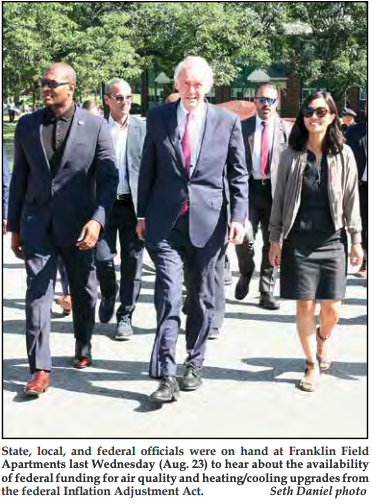September 13, 2023

When Jossie Leon is in her housing unit at the Franklin Field Apartments, she describes the air quality as being so bad it causes her to cough more inside than outside. In the winter months, snow sometimes comes through the windows, a common problem for many living in the public housing development west of the Blue Hill Ave.-Talbot Ave. intersection.
The indoor living environment badly needs investment, said Leon during a press conference last Wednesday (Aug. 23) outside the complex. Officials from federal Environmental Protection Agency (EPA) Administrator Michael Regan, US Sen. Ed Markey to Gov. Healey and Mayor Wu were on site to tout the availability of money from the federal Inflation Reduction Act to improve windows, roofs, and heating/air conditioning units in seven of the development’s buildings containing more than 500 housing units.
“I would like the children I raised and the children I teach to grow up in safe and healthy housing,” said Leon, who is the leader of the Estrellas Tropicales dance troupe. “Today a lot of the discussion is about building, but this occasion is about more than that. It’s about us, the residents of Franklin Field and our homes…We need better air quality in Franklin Field. Every level of government should invest in public housing first and not last.”
The officials responded that that is what they are doing with the $21 billion Greenhouse Gas Reduction Fund. Applications now available for money to help communities – particularly low-income communities and public housing developments – improve air quality and heating/cooling efficiency.
Kenzie Bok, the Boston Housing Authority administrator, and the BHA’s Joel Wool said they hope to use federal monies to pilot innovations at Franklin Field and the Mildred Hailey Apartments in Jamaica Plain.
“We’re in front of seven buildings connected by a central boiler plant,” said Wool, noting that it used to be oil-burning, but was converted to gas in 2002. Added Bok: “Our plan was to replace this gas boiler and we decided instead to go fossil fuel free. We’re trying to do that before 2030. The best way of going fossil fuel free is not to add more fossil fuel infrastructure.”
She and Wool said they are looking at replacing windows, roofs, and updating heating/cooling infrastructure. That could include all new heat pumps (providing heating and cooling), or it could be a new network of geothermal technology on site.
“We’re excited about looking into the geothermal opportunity here,” said Wool.
For Sen. Markey, the event marked the culmination of decades of advocacy for a funding source called a “Climate Bank.” He shared that as a congressman, he got it passed in the House of Representatives in 2009, only to have it cut in the Senate. His advocacy has continued over the years, but it wasn’t until the Inflation Act that he was able to get everyone on board. Now, that funding mechanism he dreamed about to help elevate climate and resiliency solutions is at work in places like Franklin Field, he said.
“A vision without funding is an hallucination,” he said. “After years of Republican climate denial, we are here to celebrate $21 billion in funding…that has turned this vision into reality.”
Healey was on hand to tell everyone that the state has already taken measures, like starting the new Community Climate Bank, to be ready for the billions available from the federal government for dedicated purposes.
“Our Climate Bank makes us eligible for the new funding at the federal level and our affordable housing focus gives us an advantage,” she said. “This is a powerful example of how, if we go all in and work together, we’ll see unprecedented returns.”
She said she pledged to make sure that Massachusetts would be first in line for the new federal funding, using her newly formed Office of Federal Funds to seek out every dollar the state can get.
Said Wu: “We’ve been sounding the alarm for so many years on climate and racial disparities and calling people to be at the forefront of the biggest issues. This is an investment unlike any other.”
The EPA’s Regan congratulated Franklin Field, Boston, and Massachusetts for being ready to quickly jump on these funding opportunities to reduce climate impacts. “We’re taking local and state stories here and turning them into a national story,” he said. “We know solutions don’t start at the top; they come from the ground level up.”
Union leaders like Dorchester’s Brian Doherty, of the Boston Building and Construction Trade Council, and Darlene Lombos, executive secretary-treasurer of the Greater Boston Labor Council (GBLC), were also on hand to advocate and celebrate the use of union labor within the upcoming projects funded by the Climate Bank.
The national clean financing network, which is based on Markey’s Climate Bank idea, means to mobilize private capital into clean technology projects to create good-paying jobs and lower energy costs for American families, especially in low-income and disadvantaged communities, while cutting harmful pollution to protect people’s health and tackle the climate crisis.

